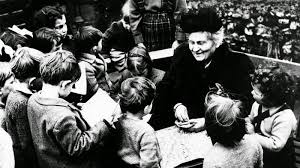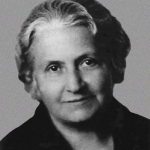 Education works towards a three-way objective: self-confidence, self-esteem, and autonomy.
Education works towards a three-way objective: self-confidence, self-esteem, and autonomy.
A little history
In 1907, Maria Montessori, the first ever woman in Italy to earn a degree in medicine, created the first “Casa dei Bambini” for young children from Rome’s popular San Lorenzo quarter. By observing, researching and experimenting, Maria built up and tested her teaching method founded on two major principles: the absorbing mind and periods of sensitivity for the 3 to 6 year-olds; moral awareness and intellectual autonomy for the 6 to 12 year-olds.
Absorbing mind
- A child aged between 3 and 6 is capable of consciously absorbing significant amounts of information stemming from his or her environment. This absorption works through the five senses.
- The mission of educators is to feed this “absorbing mind” using the right sensory-based material.
- Freedom of absorption in this manner enables children to build their inner security, their independence and their intelligence:
“Help me to do
it by myself”
Moral awareness
A child aged between 6 and 12 possesses a considerable sense of justice. Children want to be able to differentiate between “right” and “wrong” on their own, to know what is or is not acceptable.
A classroom is a miniature society which organises and draws up its own rules, where children query and develop their moral judgment and own ideas.
This is also the age when their imagination develops. They harbour a growing interest for “heroes”. It is the creative faculty that enables the transition to abstraction.
Periods of Sensitivity
“These are special sensitivities found in developing persons, i.e. during the stages of childhood. They are temporary and confined to the acquisition of a given trait of character. Once this trait is developed, the sensitivity stops.”
- Order
- Movement
- Sensory refinement
- Language
- Social development
Thus, the goal of Montessori’s Cool is to provide children with an environment that responds to their sensory qualities and is adjusted to their periods of sensitivity.
Intellectual Autonomy
Children aged from 6 to 12 are interested in everything. They want to understand it all: the world, the universe… the sky’s the limit, literally! This is a time for the intake of knowledge, an extremely receptive period for learning.
Children are interested in the relations between elements, and the teaching at Montessori proposes a comprehensive, coherent and unified vision of the world.
Their spirit of reasoning needs to be exercised in a broader environment, both intellectually (universal education) and physically (classroom and the outside world).
“Help me to
think for myself”

[cws_sc_button title=’Maria Montessori, a biography’ url=’./biographie?lang=en’ new_tab=’0′ size=’regular’ alt=’0′ full_width=’0′ customize=’0′][/cws_sc_button]





